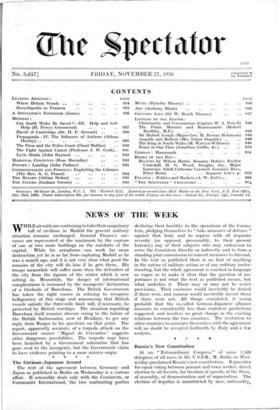Russia's New Constitufion 'At an ' "Extraordinary Congress," of some
1,500 delegates of all races in the U.S.S.R., M. Stalin on Wed- ne's:day proclaimed Russia's new constitution: It providei for equal voting between peasant and town worker, direct election to all Soviets, for freedom of speech, of the Press, of assembly, of demonstration and of organisation. The eleetion of deptities is unrestricted by 'race; nationality, religion, social origin, property status or past activities, and any public organisation or society of the workers has the right to nominate candidates. The significance of this Constitution, which is indeed the most democratic in the world, lies not in its formal provisions but in the manner in which it will be applied and administered. When first announced, it was generally accepted as a sign of the progress of the Soviets towards a stable democratic regime ; recent events in Russia have not, however, confirmed that view. Certainly the promulga- tion of the Constitution has been much influenced by foreign affairs and a desire for closer co-operation with Western democracies ; it remains to be seen whether M. Stalin thinks that end can be achieved by introducing a formal or a real democracy in the U.S.S.R. Meanwhile he has acted wisely in reprieving the German engineer who was sentenced to be shot (together with several Russians) in the latest of the " sabotage " trials. Nothing could be gained by making more trouble with Germany at this juncture.















































 Previous page
Previous page